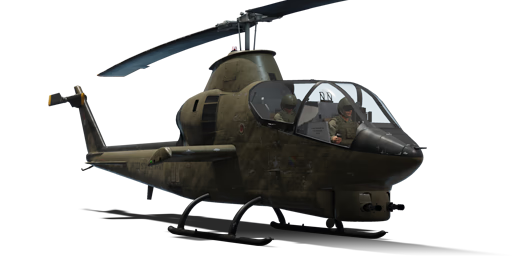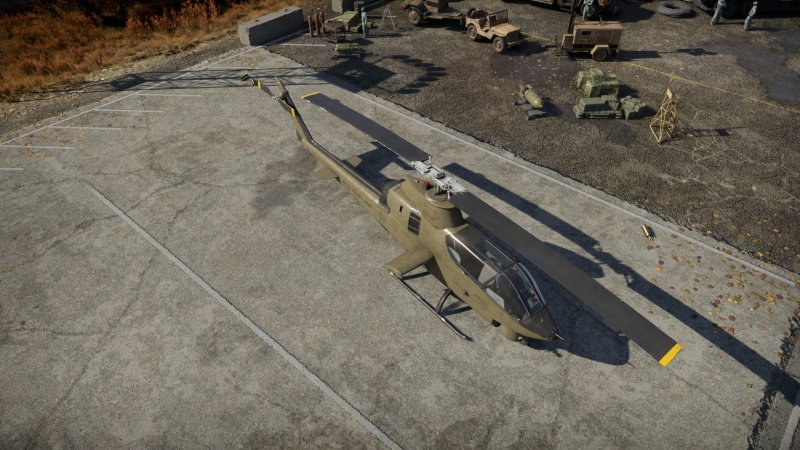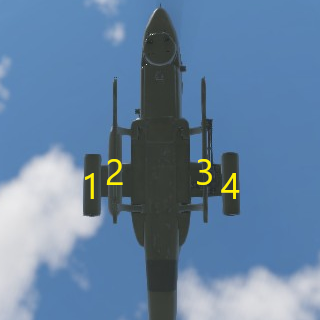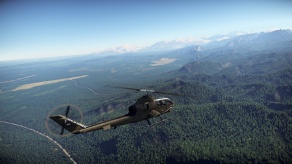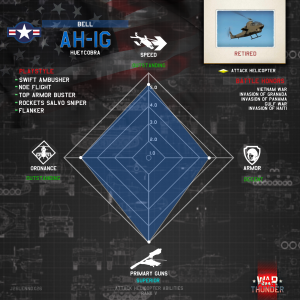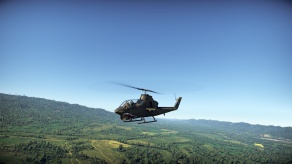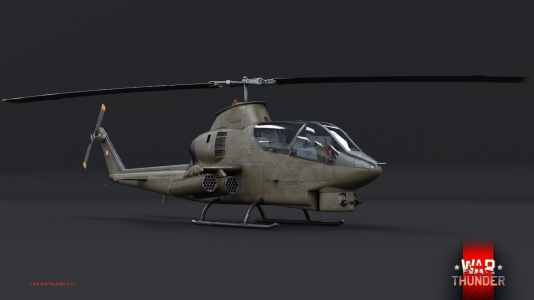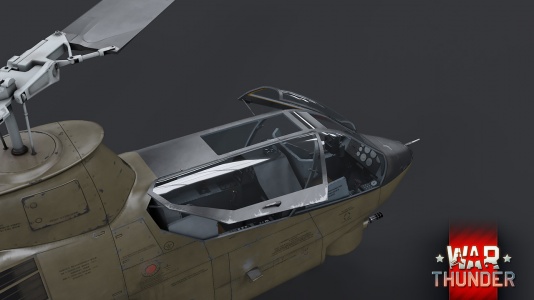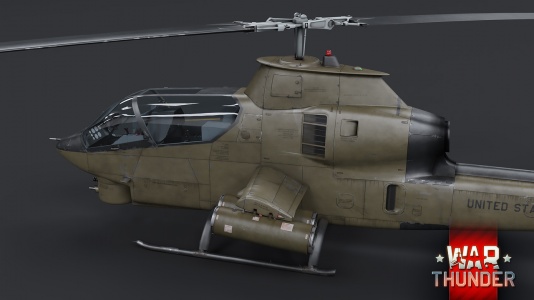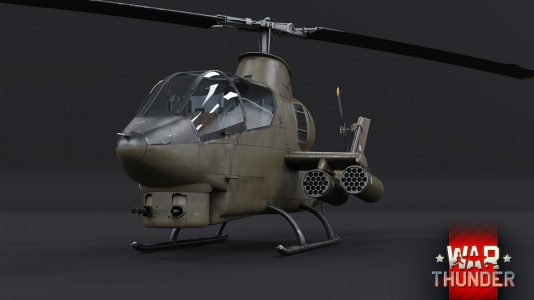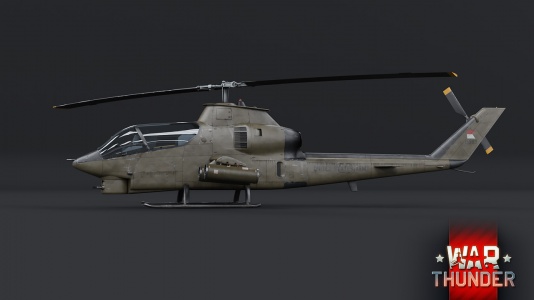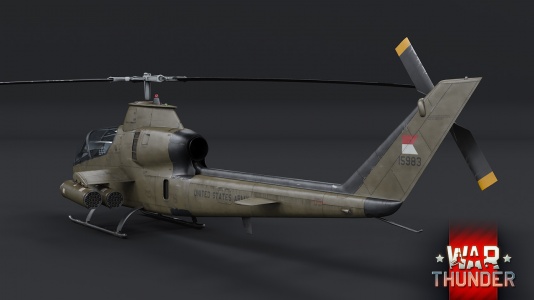Difference between revisions of "AH-1G"
(Edits.) |
(→Description) |
||
| (45 intermediate revisions by 24 users not shown) | |||
| Line 1: | Line 1: | ||
| − | |||
{{About | {{About | ||
| − | |about= | + | |about= American attack helicopter '''{{PAGENAME}}''' |
| − | |usage=other | + | |usage= other versions |
| − | |link=AH-1 (Family) | + | |link= AH-1 (Family) |
| + | }} | ||
| + | {{Specs-Card | ||
| + | |code=ah_1g | ||
| + | |images={{Specs-Card-Image|GarageImage_{{PAGENAME}}.jpg}} | ||
}} | }} | ||
== Description == | == Description == | ||
| − | <!--''In the description, the first part | + | <!-- ''In the description, the first part should be about the history of and the creation and combat usage of the helicopter, as well as its key features. In the second part, tell the reader about the helicopter in the game. Insert a screenshot of the vehicle, so that if the novice player does not remember the vehicle by name, he will immediately understand what kind of vehicle the article is talking about.'' --> |
| − | + | The '''Bell AH-1G HueyCobra''' was the first variant of the [[AH-1 (Family)|Bell AH-1 Cobra attack helicopter]]. Bell had been researching helicopter gunships since the late 1950s, and had created a mockup design mounting fixed guns and turrets, as well as stub wings for ordnance hardpoints, onto a sleeker model of their proven UH-1 Iroquois utility helicopter. The US Army showed initial interest and requested a proof-of-concept, for which Bell equipped their Model 47 light helicopter with stub wings and gun turret. However, this was determined to be too small and underpowered, resulting in the launch of the Advanced Aerial Fire Support System (AAFSS) competition in 1964, to which Bell was not invited. However, as the Vietnam War advanced to 1965, attacks on US soldiers became more prevalent, while the AAFSS program had become bogged down in technical difficulties and political disputes. The necessity for a new gunship became obvious, and the US Army approached five different companies with their desire for an urgent interim solution. | |
| − | |||
| − | The ''' | ||
| − | + | Meanwhile, Bell had been independently designing a new prototype attack helicopter, Model 209, largely resembling the original mockup based on the UH-1. Much of the aircrafts' major components were shared, on the assumption that the Army were likely to prefer a design that could be produced by modifying existing inventory. The first test flight on 7 September 1965 was met with particular interest from officials, and while other companies also submitted armed variants of their existing helicopters, Bell was awarded the production contract in April 1966. Mass production of the new helicopter, now designated AH-1G ''Cobra'', began with little adjustment from the original Model 209 prototype with an initial batch of 110 aircraft, rapidly increasing to 500 Cobras by the end of the year. | |
| + | |||
| + | Introduced in [[Update 1.81 "The Valkyries"]], the AH-1G is the first helicopter available in the US helicopter tech tree. Being a dedicated attack helicopter, it is much more agile compared to its ancestor, the Bell UH-1 Iroquois. Offensive weaponry is mainly limited to unguided FFAR Mighty Mouse rockets. This, coupled with the fact that the AH-1G lacks a ballistic computer, means that hitting targets from long distances will prove difficult. Furthermore, the AH-1G lacks access to any forms of anti-tank guided missiles (ATGMs), so engagement with enemy ground forces will always require the player to fly the AH-1G into the battlefield. This greatly increases the vulnerability of the AH-1G to attacks from enemy SPAA, so careful planning is required. | ||
== General info == | == General info == | ||
| − | === Flight | + | === Flight performance === |
| − | ''Describe how the | + | {{Specs-Heli-Flight}} |
| + | <!-- ''Describe how the helicopter behaves in the air. Speed, manoeuvrability, acceleration and allowable loads - these are the most important characteristics of the vehicle.'' --> | ||
| + | |||
| + | Despite having not the best flight performance at high altitude, it is still superior than most counterparts. It can struggle to get off the ground when fully loaded, and the collective cannot be increased to 100% without causing a severe decrease in engine RPM and unneeded lift. Using 80% is more than enough for low level flight at high speed. | ||
| + | |||
| + | It is manoeuvrable at low and medium speed, and can get up to 255 km/h in a straight line at low level. Is recommended to set the roll control to manual to help during manoeuvres, as the helicopters veers to the sides during high speed flight. | ||
{| class="wikitable" style="text-align:center" | {| class="wikitable" style="text-align:center" | ||
|- | |- | ||
| − | ! | + | ! rowspan="2" | Characteristics |
| − | |||
| − | |||
| − | |||
! colspan="2" | Max Speed<br>(km/h at 1,000 m) | ! colspan="2" | Max Speed<br>(km/h at 1,000 m) | ||
| − | ! rowspan="2" | Max altitude<br>( | + | ! rowspan="2" | Max altitude<br>(metres) |
|- | |- | ||
| − | ! AB | + | ! AB !! RB |
| − | ! RB | ||
| − | |||
| − | |||
| − | |||
| − | |||
| − | |||
| − | |||
| − | |||
|- | |- | ||
| − | ! | + | ! Stock |
| − | + | | 258 || 245 || rowspan="2" | {{Specs|ceiling}} | |
|- | |- | ||
| − | | | + | ! Upgraded |
| + | | 296 || 277 | ||
|- | |- | ||
|} | |} | ||
=== Survivability and armour === | === Survivability and armour === | ||
| − | <!--Examine the survivability of the helicopter. Note how vulnerable the structure is and how secure the pilot is, | + | {{Specs-Heli-Armour}} |
| + | <!-- ''Examine the survivability of the helicopter. Note how vulnerable the structure is and how secure the pilot is, whether the fuel tanks are armoured, etc. Describe the armour, if there is any, and also mention the vulnerability of other critical systems.'' --> | ||
* 12 mm steel - engine | * 12 mm steel - engine | ||
* 20 mm composite boron-carbide - pilot/gunner seats | * 20 mm composite boron-carbide - pilot/gunner seats | ||
| + | * Self-sealing fuel tanks: 2 in central fuselage | ||
| + | |||
| + | The AH-1G is by no means the most survivable helicopter, with relatively weak armour just enough to cover the pilots and fuel tanks that are prone to catching on fire. However, if the helicopter removes the threat of AA before dealing with other targets and stays out of machine guns' range, it is very effective. | ||
| − | + | === Modifications and economy === | |
| + | {{Specs-Economy}} | ||
== Armaments == | == Armaments == | ||
| + | {{Specs-Heli-Armaments}} | ||
=== Offensive armament === | === Offensive armament === | ||
| − | <!--Describe the offensive armament of the | + | {{Specs-Heli-Offensive}} |
| − | {{main|M134 Minigun (7.62 mm)}} | + | <!-- ''Describe the offensive armament of the helicopter, if any. Describe how effective the cannons and machine guns are in battle, also what ammunition belts or drums are better to use. If there is no offensive weaponry, delete this subsection.'' --> |
| − | The AH-1G can carry up to 4 x 7.62 mm miniguns with a very generous ammo supply allowing it to put out an extremely dense amount of fire over an extended period. This should be used to the pilot's advantage when engaging enemy aircraft in the skies. | + | {{main|M129 (40 mm)|M134 Minigun (7.62 mm)}} |
| + | |||
| + | The '''''{{PAGENAME}}''''' is armed with: | ||
| + | |||
| + | * A choice between two presets: | ||
| + | ** 2 x 7.62 mm M134 Minigun machine guns (4,000 rpg = 8,000 total) | ||
| + | ** 2 x 40 mm M129 cannons (300 rpg = 600 total) | ||
| + | |||
| + | The AH-1G can carry up to 4 x 7.62 mm miniguns with a very generous ammo supply allowing it to put out an extremely dense amount of fire over an extended period. This should be used to the pilot's advantage when engaging enemy aircraft in the skies. | ||
| + | |||
| + | The standard armament of the AH-1G can be switched for a dual 40 mm M129 grenade launcher (can be researched as a tier II modification). This is an excellent CQB weapon, and has much better penetration then the miniguns. However, the range is very short, it can't be used against aircraft, and it can be tricky to aim. | ||
=== Suspended armament === | === Suspended armament === | ||
| − | <!--Describe the | + | {{Specs-Heli-Suspended}} |
| − | {{ | + | <!-- ''Describe the helicopter's suspended armament: additional cannons under the winglets, any bombs, and rockets. Since any helicopter is essentially only a platform for suspended weaponry, this section is significant and deserves your special attention. If there is no suspended weaponry remove this subsection.'' --> |
| + | |||
| + | The '''''{{PAGENAME}}''''' can be outfitted with the following ordnance: | ||
| + | |||
| + | {| class="wikitable" style="text-align:center" width="100%" | ||
| + | |- | ||
| + | ! !! width="11%" | 1 !! width="11%" | 2 !! width="11%" | 3 !! width="11%" | 4 | ||
| + | | rowspan="4" width="20%" | <div class="ttx-image">[[File:Hardpoints_AH-1G_(Israel).png]]</div> | ||
| + | |- | ||
| + | ! [[M195 (20 mm)|20 mm M195]] cannons (950 rpg) | ||
| + | | || || 1 || | ||
| + | |- | ||
| + | ! [[M134 Minigun (7.62 mm)|7.62 mm M134 Minigun]] machine guns (1,500 rpg) | ||
| + | | || 1 || 1 || | ||
| + | |- | ||
| + | ! [[FFAR Mighty Mouse]] rockets | ||
| + | | 7, 19 || 7, 19 || 7, 19 || 7, 19 | ||
| + | |- | ||
| + | |} | ||
| + | {{Navigation-Start|Default weapon presets}} | ||
| + | {{Navigation-First-Simple-Line}} | ||
| + | * Without load | ||
* 28 x FFAR Mighty Mouse rockets | * 28 x FFAR Mighty Mouse rockets | ||
* 76 x FFAR Mighty Mouse rockets | * 76 x FFAR Mighty Mouse rockets | ||
| − | * 2 x 7.62 mm M134 Minigun machine | + | * 2 x 7.62 mm M134 Minigun machine guns (1,500 rpg = 3,000 total) |
| − | * 1 x 20 mm M195 cannon ( | + | * 1 x 20 mm M195 cannon (950 rpg) |
| − | + | {{Navigation-End}} | |
| − | |||
| − | Unlike other AH series helicopters, the AH-1G can equip either two 7.62 mm Miniguns or one 20 mm Gatling gun as suspended armaments. The minigun can pack a real punch when engaging enemy helicopters due to their light armour, however, the one drawback will be the pilot will have to deal with the massive recoil from the fast rate of fire. | + | Unlike other AH-1 series helicopters, the AH-1G can equip either two 7.62 mm Miniguns or one 20 mm Gatling gun as suspended armaments. The minigun can pack a real punch when engaging enemy helicopters due to their light armour, however, the one drawback will be the pilot will have to deal with the massive recoil from the fast rate of fire. |
| − | The AH-1G can also serve in a | + | The AH-1G can also serve in a ground pounding role by equipping FFAR rockets that can reload quite quickly while still being able to defend itself with its turret miniguns. While the AH-1G cannot carry as much ordnance as its Soviet counterparts, it can defend itself very well and even equip suspended armament such as rockets, something which the Soviet choppers cannot do until BR 9.7. |
== Usage in battles == | == Usage in battles == | ||
| − | <!--Describe the tactics of playing in | + | <!-- ''Describe the tactics of playing in a helicopter, the features of using the helicopter in a team and advice on tactics. Refrain from creating a "guide" - do not impose a single point of view, but instead, give the reader food for thought. Examine the most dangerous enemies and give recommendations on fighting them. If necessary, note the specifics of the game in different modes (AB, RB, SB).'' --> |
| + | The main use of this helicopter within War Thunder is on Realistic tank battles. | ||
| + | |||
| + | The AH-1G is amongst the most influential vehicle in tank battles as on this mode the AH-1G can effectively serve as a pure CAS helicopter. But patience and methodical attacks must be practiced to survive and outlast each attack run. Otherwise this helicopter becomes a cheerful sighting for the awaiting enemy anti-air defences. | ||
| + | |||
| + | Players should remember these "Rules of Engagement": | ||
| + | |||
| + | * Avoid attacking frontally, the enemy is waiting from this direction. Flank the map and attack by the sides; is more effective and safe for the AH-1G. | ||
| + | * Ideally never climb and gain altitude. The helicopter can fly really well at low altitude, use it. Tree-top height or lower. | ||
| + | * Attempt to never stop or hover over the battlefield. Into the battle at low altitude and retreat in the same manner; stopping mid-air for a single target is prejudicial for the AH-1G. | ||
| + | * Conserve speed. If the points above are taken into account, speed will be maintained and survivability drastically increased. | ||
| + | |||
| + | [[File:AH-1G Test fly.jpg|thumb|292x292px|A brief test fly screenshot]] | ||
| + | |||
| + | The AH-1G is sluggish when it comes to climbing rate. This results in the vehicle being very manoeuvrable at low altitudes. When playing with rockets is best to use all the salvos needed for any target. Striking with great amount of fire is more effective than trying to conserve rockets during one pass. The twin 40 mm grenade launcher is the best for dealing with tanks at a close range battle but players should be very careful of any tanks or SPAA and not stick around for too long. | ||
| + | |||
| + | The one of the best and more deadly loads are the 76 x FFAR Mighty Mouse rockets, and the 40 mm as a back up weapon. | ||
| + | |||
| + | If possible never gain altitude during the attack runs, realize the most enemy-crowded zones in the battle and pass by at really high speed unleashing the Mighty Mouse salvos. Trying to catch something in just one pass, don't stop by as most tanks are well armed with coaxial and cupola turrets. If nothing was spotted during the high-speed low pass and the run was unsuccessful, attempt to repeat but from another path. | ||
| + | |||
| + | If the attack was successful, retreat to rearm and consider another run, depending whether or not the enemy achieved air superiority. | ||
| + | |||
| + | '''Helicopter EC''' | ||
| + | |||
In helicopter battles, the AH-1G serves best in an anti-air role by combating other enemy helicopters. Due to being the only dedicated attack helicopter for the first half of the USA helicopter tree, it serves as the backbone for eliminating enemy air threats for US pilots until the AH-1F and AH-1Z become researchable. | In helicopter battles, the AH-1G serves best in an anti-air role by combating other enemy helicopters. Due to being the only dedicated attack helicopter for the first half of the USA helicopter tree, it serves as the backbone for eliminating enemy air threats for US pilots until the AH-1F and AH-1Z become researchable. | ||
| − | + | '''Fighting the AH-1G''' | |
| − | + | When fighting the AH-1G, it is always a good bet to get the "High Ground" or altitude advantage of this vehicle. Try to strafe it and get around to its blinds spot, as it can't use the tail rotor effectively when moving. Always aim for the cockpit, as one the gunner is knocked out the turret becomes unusable. When coming up against a Cobra with gun pods, or and secondary weapons, know that the pilot can still fire these even if the Gunner in knocked out. | |
=== Pros and cons === | === Pros and cons === | ||
| − | <!-- | + | <!-- ''Summarise and briefly evaluate the vehicle in terms of its characteristics and combat effectiveness. Mark its pros and cons in the bulleted list. Try not to use more than 6 points for each of the characteristics. Avoid using categorical definitions such as "bad", "good" and the like - use substitutions with softer forms such as "inadequate" and "effective".'' --> |
| + | [[File:Radar chart AH-1G.png|thumb|Attack helicopter abilities of the AH-1G Cobra.]] | ||
'''Pros:''' | '''Pros:''' | ||
| + | * Is the fastest starting helicopter | ||
* Two miniguns have a very high rate of fire | * Two miniguns have a very high rate of fire | ||
* Fairly small target due to its small width dimension | * Fairly small target due to its small width dimension | ||
| − | * Can equip several | + | * Can equip several Mighty Mouse rocket pods, miniguns, and cannon as payload |
* Miniguns do not jam unlike conventional guns | * Miniguns do not jam unlike conventional guns | ||
| − | * Twin | + | * Twin 40 mm grenade launchers are very effective against a tank, even at high ranks |
| − | * Has the best CAS capability for | + | * Has the best CAS capability for a starting helicopter |
| + | * 7.62 mm miniguns can destroy light pillboxes when fire for a prolonged time | ||
'''Cons:''' | '''Cons:''' | ||
| Line 97: | Line 157: | ||
* Limited traverse for the miniguns | * Limited traverse for the miniguns | ||
* Does not have any guided munitions | * Does not have any guided munitions | ||
| − | * | + | * 40 mm grenade has a slow travel speed, the pilot has to aim away from the enemy to hit |
| − | |||
* Slow climb rate if using a heavy payload | * Slow climb rate if using a heavy payload | ||
| + | * Stock 7.62 mm minigun is insufficient against anything other than light pillboxes | ||
== History == | == History == | ||
| − | <!--''Describe the history of the creation and combat usage of the helicopter in more detail than in the introduction. If the historical reference turns out to be too | + | <!-- ''Describe the history of the creation and combat usage of the helicopter in more detail than in the introduction. If the historical reference turns out to be too long, take it to a separate article, taking a link to the article about the vehicle and adding a block "/History" (example: <nowiki>https://wiki.warthunder.com/(Vehicle-name)/History</nowiki>) and add a link to it here using the <code>main</code> template. Be sure to reference text and sources by using <code><nowiki><ref></ref></nowiki></code>, as well as adding them at the end of the article with <code><nowiki><references /></nowiki></code>. This section may also include the vehicle's dev blog entry (if applicable) and the in-game encyclopedia description (under <code><nowiki>=== In-game description ===</nowiki></code>, also if applicable).'' --> |
| − | Parallel to the development of the UH-1 transport helicopter, Bell was actively conducting research on helicopter gunship designs. This resulted in the creation of the | + | [[File:AH-1G .jpg|alt=Brief test fly screenshot.|thumb|292x292px]] |
| + | Parallel to the development of the UH-1 transport helicopter, Bell was actively conducting research on helicopter gunship designs. This resulted in the creation of the Model D255 "Iroquois Warrior", a mockup of a gunship design based on components from the UH-1B Huey. The mockup was presented to interested Army officials in June 1962, resulting in a proof-of-concept contract later that year. Following the contract award, Bell created the Model 207 "Sioux Scout", which was evaluated by the Army in early 1964. | ||
| − | Although impressed by the Model 207, the Army sought a larger and more powerful design, resulting in the creation of a new competition of which Bell was not a part of. Instead, Bell independently continued developing and refining their gunship design, | + | Although impressed by the Model 207, the Army sought a larger and more powerful design, resulting in the creation of a new competition (AAFSS Advanced Aerial Fire Support System), of which Bell was not a part of. Instead, Bell independently continued developing and refining their gunship design, eventually creating the Model 209 - a design that was a combination of the Iroquois Warrior mockup and the concepts behind the Model 207. |
| − | Meanwhile, the ongoing Vietnam War sparked an urgent demand for dedicated attack helicopters. Although gunship versions of the UH-1 performed this role with relative success, the fact that they | + | Meanwhile, the ongoing Vietnam War sparked an urgent demand for dedicated attack helicopters. Although gunship versions of the UH-1 performed this role with relative success, the fact that they weren't initially intended for this role somewhat limited their effectiveness. Back in the States, the Army's ongoing competition produced no winning design as a result of technical and political difficulties. To quickly address their demand, the Army started looking for an interim design to act as a stopgap measure in 1965. |
Soon after testing of the Model 209 concluded in September 1965, the Army decided to award Bell with a manufacturing contract later that year. The contract officially put the Model 209 into production under the Army designation of UH-1H Huey Cobra but was later redesignated to AH-1G Cobra. | Soon after testing of the Model 209 concluded in September 1965, the Army decided to award Bell with a manufacturing contract later that year. The contract officially put the Model 209 into production under the Army designation of UH-1H Huey Cobra but was later redesignated to AH-1G Cobra. | ||
| − | The AH-1G Cobra entered service with the U.S. Army in 1967, participating mainly through the remainder of the Vietnam War as well as other conflicts. The AH-1G was retired from active service in the early 1980s, being replaced by newer models of the Cobra. | + | The AH-1G Cobra entered service with the U.S. Army in 1967, participating mainly through the remainder of the Vietnam War as well as other conflicts. The AH-1G was retired from active service in the early 1980s, being replaced by newer models of the Cobra. The AH-1G also served with the Spanish Navy 1971 - 1985. And with the Israeli Armed forces from 1974 -1977. |
| − | ''- From [ | + | ''- From [[wt:en/news/5730-development-ah-1g-cobra-strike-fast-strike-hard-en|Devblog]]'' |
== Media == | == Media == | ||
| − | '' | + | <!-- ''Excellent additions to the article would be video guides, screenshots from the game, and photos.'' --> |
| + | |||
| + | ;Skins | ||
| + | |||
| + | * [https://live.warthunder.com/feed/camouflages/?vehicle=ah_1g Skins and camouflages for the {{PAGENAME}} from live.warthunder.com.] | ||
| + | |||
| + | ;Images | ||
| + | <gallery mode="packed" heights="200"> | ||
| + | File:AH-1G WTWallpaper 001.jpg | ||
| + | File:AH-1G WTWallpaper 002.jpg | ||
| + | File:AH-1G WTWallpaper 003.jpg | ||
| + | File:AH-1G WTWallpaper 004.jpg | ||
| + | File:AH-1G WTWallpaper 005.jpg | ||
| + | File:AH-1G WTWallpaper 006.jpg | ||
| + | </gallery> | ||
| + | |||
| + | ;Videos | ||
| + | {{Youtube-gallery|zYbcq-KOpFE|'''AH-1 Cobra Ultimate Review''' - ''Bob Dickinson''|6QZAY1EtkFU|'''The Shooting Range #110''' - ''Pages of History'' section at 05:44 discusses the AH-1 Cobra. }} | ||
== See also == | == See also == | ||
| − | ''Links to the articles on the War Thunder Wiki that you think will be useful for the reader, for example:'' | + | <!-- ''Links to the articles on the War Thunder Wiki that you think will be useful for the reader, for example:'' |
| + | * ''reference to the series of the helicopter;'' | ||
| + | * ''links to approximate analogues of other nations and research trees.'' --> | ||
| + | |||
| + | ;Related development | ||
| − | * | + | * [[AH-1 (Family)]] |
| − | |||
== External links == | == External links == | ||
| − | <!--''Paste links to sources and external resources, such as:'' | + | <!-- ''Paste links to sources and external resources, such as:'' |
* ''topic on the official game forum;'' | * ''topic on the official game forum;'' | ||
| − | + | * ''other literature.'' --> | |
| − | * ''other literature.''--> | ||
| − | * [ | + | * [[wt:en/news/5730-development-ah-1g-cobra-strike-fast-strike-hard-en|[Devblog] AH-1G Cobra: Strike Fast, Strike Hard]] |
| + | {{AirManufacturer Bell}} | ||
{{USA helicopters}} | {{USA helicopters}} | ||
Latest revision as of 14:04, 10 December 2023
| This page is about the American attack helicopter AH-1G. For other versions, see AH-1 (Family). |
Contents
Description
The Bell AH-1G HueyCobra was the first variant of the Bell AH-1 Cobra attack helicopter. Bell had been researching helicopter gunships since the late 1950s, and had created a mockup design mounting fixed guns and turrets, as well as stub wings for ordnance hardpoints, onto a sleeker model of their proven UH-1 Iroquois utility helicopter. The US Army showed initial interest and requested a proof-of-concept, for which Bell equipped their Model 47 light helicopter with stub wings and gun turret. However, this was determined to be too small and underpowered, resulting in the launch of the Advanced Aerial Fire Support System (AAFSS) competition in 1964, to which Bell was not invited. However, as the Vietnam War advanced to 1965, attacks on US soldiers became more prevalent, while the AAFSS program had become bogged down in technical difficulties and political disputes. The necessity for a new gunship became obvious, and the US Army approached five different companies with their desire for an urgent interim solution.
Meanwhile, Bell had been independently designing a new prototype attack helicopter, Model 209, largely resembling the original mockup based on the UH-1. Much of the aircrafts' major components were shared, on the assumption that the Army were likely to prefer a design that could be produced by modifying existing inventory. The first test flight on 7 September 1965 was met with particular interest from officials, and while other companies also submitted armed variants of their existing helicopters, Bell was awarded the production contract in April 1966. Mass production of the new helicopter, now designated AH-1G Cobra, began with little adjustment from the original Model 209 prototype with an initial batch of 110 aircraft, rapidly increasing to 500 Cobras by the end of the year.
Introduced in Update 1.81 "The Valkyries", the AH-1G is the first helicopter available in the US helicopter tech tree. Being a dedicated attack helicopter, it is much more agile compared to its ancestor, the Bell UH-1 Iroquois. Offensive weaponry is mainly limited to unguided FFAR Mighty Mouse rockets. This, coupled with the fact that the AH-1G lacks a ballistic computer, means that hitting targets from long distances will prove difficult. Furthermore, the AH-1G lacks access to any forms of anti-tank guided missiles (ATGMs), so engagement with enemy ground forces will always require the player to fly the AH-1G into the battlefield. This greatly increases the vulnerability of the AH-1G to attacks from enemy SPAA, so careful planning is required.
General info
Flight performance
Despite having not the best flight performance at high altitude, it is still superior than most counterparts. It can struggle to get off the ground when fully loaded, and the collective cannot be increased to 100% without causing a severe decrease in engine RPM and unneeded lift. Using 80% is more than enough for low level flight at high speed.
It is manoeuvrable at low and medium speed, and can get up to 255 km/h in a straight line at low level. Is recommended to set the roll control to manual to help during manoeuvres, as the helicopters veers to the sides during high speed flight.
| Characteristics | Max Speed (km/h at 1,000 m) |
Max altitude (metres) | |
|---|---|---|---|
| AB | RB | ||
| Stock | 258 | 245 | |
| Upgraded | 296 | 277 | |
Survivability and armour
- 12 mm steel - engine
- 20 mm composite boron-carbide - pilot/gunner seats
- Self-sealing fuel tanks: 2 in central fuselage
The AH-1G is by no means the most survivable helicopter, with relatively weak armour just enough to cover the pilots and fuel tanks that are prone to catching on fire. However, if the helicopter removes the threat of AA before dealing with other targets and stays out of machine guns' range, it is very effective.
Modifications and economy
Armaments
Offensive armament
The AH-1G is armed with:
- A choice between two presets:
- 2 x 7.62 mm M134 Minigun machine guns (4,000 rpg = 8,000 total)
- 2 x 40 mm M129 cannons (300 rpg = 600 total)
The AH-1G can carry up to 4 x 7.62 mm miniguns with a very generous ammo supply allowing it to put out an extremely dense amount of fire over an extended period. This should be used to the pilot's advantage when engaging enemy aircraft in the skies.
The standard armament of the AH-1G can be switched for a dual 40 mm M129 grenade launcher (can be researched as a tier II modification). This is an excellent CQB weapon, and has much better penetration then the miniguns. However, the range is very short, it can't be used against aircraft, and it can be tricky to aim.
Suspended armament
The AH-1G can be outfitted with the following ordnance:
| 1 | 2 | 3 | 4 | ||
|---|---|---|---|---|---|
| 20 mm M195 cannons (950 rpg) | 1 | ||||
| 7.62 mm M134 Minigun machine guns (1,500 rpg) | 1 | 1 | |||
| FFAR Mighty Mouse rockets | 7, 19 | 7, 19 | 7, 19 | 7, 19 |
| Default weapon presets | |
|---|---|
| |
Unlike other AH-1 series helicopters, the AH-1G can equip either two 7.62 mm Miniguns or one 20 mm Gatling gun as suspended armaments. The minigun can pack a real punch when engaging enemy helicopters due to their light armour, however, the one drawback will be the pilot will have to deal with the massive recoil from the fast rate of fire.
The AH-1G can also serve in a ground pounding role by equipping FFAR rockets that can reload quite quickly while still being able to defend itself with its turret miniguns. While the AH-1G cannot carry as much ordnance as its Soviet counterparts, it can defend itself very well and even equip suspended armament such as rockets, something which the Soviet choppers cannot do until BR 9.7.
Usage in battles
The main use of this helicopter within War Thunder is on Realistic tank battles.
The AH-1G is amongst the most influential vehicle in tank battles as on this mode the AH-1G can effectively serve as a pure CAS helicopter. But patience and methodical attacks must be practiced to survive and outlast each attack run. Otherwise this helicopter becomes a cheerful sighting for the awaiting enemy anti-air defences.
Players should remember these "Rules of Engagement":
- Avoid attacking frontally, the enemy is waiting from this direction. Flank the map and attack by the sides; is more effective and safe for the AH-1G.
- Ideally never climb and gain altitude. The helicopter can fly really well at low altitude, use it. Tree-top height or lower.
- Attempt to never stop or hover over the battlefield. Into the battle at low altitude and retreat in the same manner; stopping mid-air for a single target is prejudicial for the AH-1G.
- Conserve speed. If the points above are taken into account, speed will be maintained and survivability drastically increased.
The AH-1G is sluggish when it comes to climbing rate. This results in the vehicle being very manoeuvrable at low altitudes. When playing with rockets is best to use all the salvos needed for any target. Striking with great amount of fire is more effective than trying to conserve rockets during one pass. The twin 40 mm grenade launcher is the best for dealing with tanks at a close range battle but players should be very careful of any tanks or SPAA and not stick around for too long.
The one of the best and more deadly loads are the 76 x FFAR Mighty Mouse rockets, and the 40 mm as a back up weapon.
If possible never gain altitude during the attack runs, realize the most enemy-crowded zones in the battle and pass by at really high speed unleashing the Mighty Mouse salvos. Trying to catch something in just one pass, don't stop by as most tanks are well armed with coaxial and cupola turrets. If nothing was spotted during the high-speed low pass and the run was unsuccessful, attempt to repeat but from another path.
If the attack was successful, retreat to rearm and consider another run, depending whether or not the enemy achieved air superiority.
Helicopter EC
In helicopter battles, the AH-1G serves best in an anti-air role by combating other enemy helicopters. Due to being the only dedicated attack helicopter for the first half of the USA helicopter tree, it serves as the backbone for eliminating enemy air threats for US pilots until the AH-1F and AH-1Z become researchable.
Fighting the AH-1G
When fighting the AH-1G, it is always a good bet to get the "High Ground" or altitude advantage of this vehicle. Try to strafe it and get around to its blinds spot, as it can't use the tail rotor effectively when moving. Always aim for the cockpit, as one the gunner is knocked out the turret becomes unusable. When coming up against a Cobra with gun pods, or and secondary weapons, know that the pilot can still fire these even if the Gunner in knocked out.
Pros and cons
Pros:
- Is the fastest starting helicopter
- Two miniguns have a very high rate of fire
- Fairly small target due to its small width dimension
- Can equip several Mighty Mouse rocket pods, miniguns, and cannon as payload
- Miniguns do not jam unlike conventional guns
- Twin 40 mm grenade launchers are very effective against a tank, even at high ranks
- Has the best CAS capability for a starting helicopter
- 7.62 mm miniguns can destroy light pillboxes when fire for a prolonged time
Cons:
- Limited traverse for the miniguns
- Does not have any guided munitions
- 40 mm grenade has a slow travel speed, the pilot has to aim away from the enemy to hit
- Slow climb rate if using a heavy payload
- Stock 7.62 mm minigun is insufficient against anything other than light pillboxes
History
Parallel to the development of the UH-1 transport helicopter, Bell was actively conducting research on helicopter gunship designs. This resulted in the creation of the Model D255 "Iroquois Warrior", a mockup of a gunship design based on components from the UH-1B Huey. The mockup was presented to interested Army officials in June 1962, resulting in a proof-of-concept contract later that year. Following the contract award, Bell created the Model 207 "Sioux Scout", which was evaluated by the Army in early 1964.
Although impressed by the Model 207, the Army sought a larger and more powerful design, resulting in the creation of a new competition (AAFSS Advanced Aerial Fire Support System), of which Bell was not a part of. Instead, Bell independently continued developing and refining their gunship design, eventually creating the Model 209 - a design that was a combination of the Iroquois Warrior mockup and the concepts behind the Model 207.
Meanwhile, the ongoing Vietnam War sparked an urgent demand for dedicated attack helicopters. Although gunship versions of the UH-1 performed this role with relative success, the fact that they weren't initially intended for this role somewhat limited their effectiveness. Back in the States, the Army's ongoing competition produced no winning design as a result of technical and political difficulties. To quickly address their demand, the Army started looking for an interim design to act as a stopgap measure in 1965.
Soon after testing of the Model 209 concluded in September 1965, the Army decided to award Bell with a manufacturing contract later that year. The contract officially put the Model 209 into production under the Army designation of UH-1H Huey Cobra but was later redesignated to AH-1G Cobra.
The AH-1G Cobra entered service with the U.S. Army in 1967, participating mainly through the remainder of the Vietnam War as well as other conflicts. The AH-1G was retired from active service in the early 1980s, being replaced by newer models of the Cobra. The AH-1G also served with the Spanish Navy 1971 - 1985. And with the Israeli Armed forces from 1974 -1977.
- From Devblog
Media
- Skins
- Images
- Videos
See also
- Related development
External links
| Bell Aircraft Corporation | |
|---|---|
| Aircraft | |
| Fighters | P-39N-0 · P-39Q-5 |
| P-400 | |
| P-63A-10 · P-63A-5 · P-63C-5 · ␠Kingcobra | |
| Jet Fighters | P-59A |
| Export | ▂P-39K-1 · ▂Pokryshkin's P-39N-0 · ▂P-39Q-15 · ▄P-39Q-25 |
| ▂P-63A-5 · ▂P-63A-10 · ▂P-63C-5 · ▄P-63C-5 | |
| Helicopters | |
| Attack | AH-1F · AH-1G · AH-1Z · AH-1W |
| OH-58D | |
| Utility | UH-1B · UH-1C · UH-1C XM-30 |
| Export/Licensed | ▅UH-1B · ◄UH-1D |
| Tzefa A · Tzefa B · Tzefa D/E · ▅AH-1S early · ▅AH-1S · ▅AH-1S Kisarazu · ␗AH-1W | |
| ␗OH-58D | |
| See Also | Fuji Heavy Industries · Agusta |
| USA helicopters | |
|---|---|
| Attack | |
| Black Hawk | MH-60L DAP |
| Choctaw | H-34 |
| Cobra | AH-1F · AH-1G · AH-1Z |
| SuperCobra | AH-1W |
| Kiowa | OH-58D |
| Little Bird | AH-6M |
| Apache | YAH-64 · AH-64A · ▃AH-64A Peten · AH-64A (GR) · AH-64D |
| Utility | |
| Huey | UH-1B · UH-1C · UH-1C XM-30 |


